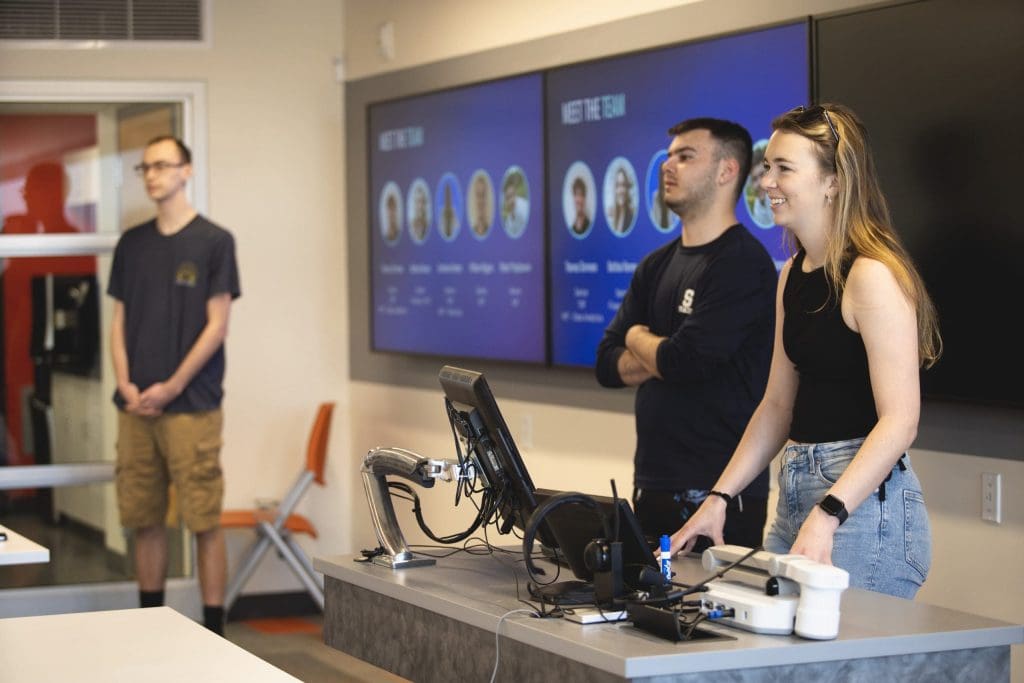Earn Your Master’s Degree in Artificial Intelligence at the iSchool
A Master’s in Artificial Intelligence from Syracuse University School of Information Studies empowers you to master cutting-edge AI technologies while staying true to ethical and human-centered principles.
With a strong emphasis on hands-on projects, students will conclude the program by creating and reflecting on their application portfolio, showcasing their practical expertise and knowledge.
Join us and become a leader in the transformative field of Artificial Intelligence.
- Human-Centered Approach
- Interdisciplinary Curriculum
- Hands-On Learning
- Portfolio Development
- Industry-Relevant Skills
- Supportive Learning Environment
Program Info

Next term starts:
Spring 2025
31
Total Credit Hours

Program Duration:
Can be completed in as little as one year

Program Delivery:
On-campus
11
Courses
Admissions Requirements
How to Apply
Tuition & Fees
Cost per
credit
$1,945
X
Number
of credits
31
=
Total
Tuition
$60,295
What Can You Do with a Master’s in Artificial Intelligence?
A master’s degree in AI can unlock a wide range of career opportunities across various industries. For instance, you might find yourself diving deep into consumer data to uncover trends as a marketing analyst or contributing to life-changing advancements in healthcare by optimizing treatment plans and diagnostics.
You could also channel your creativity into developing innovative applications at a tech startup, where your skills in AI could drive the next big breakthrough.
Career opportunities
- Machine learning engineer
- Data scientist
- Software engineer
- Business intelligence developer
- Research scientist
- Big data architect
- AI engineer
Fastest-Growing
Field in the US
Bureau of Labor Statistics
Median pay for
data scientists
Bureau of Labor Statistics
Expected Growth of
data science jobs
Much faster than average, BLS
Gain Experience.
Complement your master’s degree in AI with real-world experience. From student-led consulting projects to research endeavors, internships, networking events and more, we connect you with the experts and the expertise to take the next step in your career.


Grow Your Potential.
In addition to getting practical, on-the-job experience, you’ll have opportunities to join a research lab or collaborate with faculty on their academic work. Your focus on AI will mean your skills will be in-demand on almost any iSchool research team.


Expand Your Career.
Our dedicated Career Services team is available throughout your program and after. From resume and cover letter prep to interview training, career advising, and alumni and employer connections, you’ll have the support you need to land your dream job.



Syracuse University is accredited by
the Middle States Commission
on Higher Education Accreditation.

Courses & Curriculum
The master’s degree in artificial intelligence is 31 credits and can be completed in as little as one year. The curriculum combines a primary core, the choice of three tracks for your secondary core, and electives to give you a strong data science foundation with a focus of your choosing.
Primary Core – 21 Credits
Secondary Core – 9 Credits
Students select 3 courses (9 credits) from one of the tracks below.
Data Science
Cloud Computing
Self Guided
Students can select any three IST graduate-level courses (9 credits) that provide a coherent experience related to Applied HCAI. Students should consult with the program director to ensure the appropriateness of the courses and consider how the electives will add to their knowledge and skillset. Courses outside of the iSchool must receive permission prior to registration to be used as secondary core credit.
Exit requirement
Student Success Stories
Meet Our Alumni
At Syracuse University School of Information Studies, we believe every student has a unique story.
Our students come from diverse backgrounds and bring with them a range of experiences, but they all share one thing in common: the desire to succeed. From overcoming personal challenges to achieving academic excellence, our students demonstrate the resilience, dedication, and ambition needed to thrive in any job market.
Visit our Alumni & Friends page to discover more about their inspiring stories and connect with fellow alumni.

Jaime Banks
Leading research on social AI, Dr. Banks explores why we treat machines like real companions.

Jenny Stromer-Galley
Professor Jenny Stromer-Galley is an expert in political communication and social media, with decades of research on digital campaigning, misinformation, and online behavior.

Michael Fudge
Guiding future IS leaders, Mike Fudge unites cloud, data, and human-centered design.
Faculty Experts
At Syracuse University’s School of Information Studies, we are proud to have a distinguished team of experts who are leaders in their fields.
Each expert brings a wealth of knowledge and experience, offering students the opportunity to learn from the best.
Meet our team of experts and discover how their work is shaping the future of education and industry.
Frequently Asked Questions
How long does it take to complete the Master’s in Artificial Intelligence program?
The master’s degree in artificial intelligence is 31 credits and can be completed in as little as one year.
Is masters in artificial intelligence worth it?
Yes, it equips you with advanced, in-demand skills and opens doors to growing career opportunities in AI-driven industries.
How difficult is a master’s in AI?
The program is challenging but manageable, combining technical depth with hands-on learning to ensure your success.
Questions? We’re here to help.
Get access to upcoming events, meet with faculty and current students, connect with alumni, and see what a master’s degree can do for your career and future. Submit your contact info below and we’ll be in touch!
